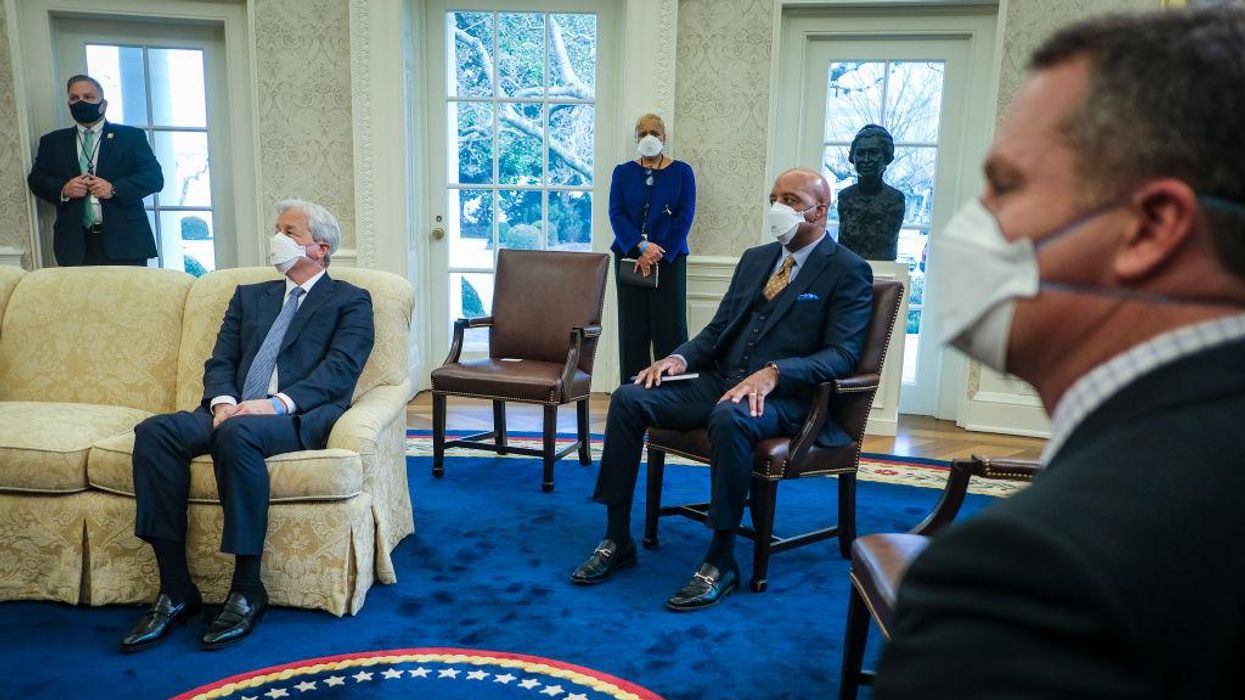The nation's CEOs have possibly never had so much power to influence elections and how they are run, or so much pressure exerted on them over how to use it.
Americans now trust the business sector more than their own government, and corporate leaders have landed squarely in the middle of a high-stakes fight over voters' access to the polls. That struggle is playing out both in states and on Capitol Hill, where CEOs have faced increasingly urgent calls from the White House to back Democrats' election reform bills.
Until now, business leaders have struggled mightily to stay out of the fray. It was one thing to contribute masks and gloves to poll workers, give employees time off to vote, and donate ballot drop boxes and stadium space during the pandemic. It's quite another to invite verbal assaults from GOP leaders by siding with Democrats over legislation, and field high-dollar attack ads from the right.
But it's getting increasingly difficult for corporate executives to remain neutral in this particular fight. For one thing, many are deeply alarmed that the election wars have moved well beyond the mechanics of voting and now threaten core principles like adherence to the truth, vote tallies based on math not politics, and the peaceful transfer of power.
After the Jan. 6 attack on the Capitol, even longtime Donald Trump allies like Ken Langone, the co-founder of Home Depot, and Atlanta Falcons owner Nelson Peltz, publicly broke ranks with the former president.
Following a flood of GOP-authored state bills this year to restrict ballot access, hundreds of prominent CEOs, corporate leaders and companies, from Amazon to BlackRock, Inc., CitiGroup, and Netflix, signed onto public statements defending Americans' right to vote.
In Florida, Georgia and a dozen other states, new laws not only enact limits like ID requirements or curbs on early voting, but make it easier to intimidate or remove election workers, directly threatening a key guardrail of democracy.
The number of business groups actively promoting voter participation and ballot access now totals more than two dozen, says Jeffrey A. Sonnenfeld, a leadership expert and professor at the Yale School of Management. Sonnenfeld helped organize a call with more than 100 corporate executives in April in part to help them sort through the proliferation of voting rights petitions coming their way.
Among the leading groups helping rally corporations behind voting is the Civic Alliance, a nonpartisan coalition that has grown from some 40 member companies since its launch in 2020 to more than 1,200 today, with some 5.5 million employees between them. Members range from behemoths like Amazon, BP and Dow Chemical Co. to smaller players like Gaia Herbs and Rad Power Bikes.
"We were really founded on a belief that an active democracy is good for business, and an engaged business community is good for democracy," says Steven Levine, who directs the Civic Alliance and who co-founded Meteorite, an agency that creates coalitions across sectors to drive social impact and community benefit.
Other prominent, pro-voting business groups include the Leadership Now Project, which describes itself as a membership group of "business and thought leaders taking action to fix democracy," and Time to Vote, a nonpartisan coalition of companies committed to making sure that employees' work schedules don't hamper their access to the polls.
Some business-led efforts, such as Fair Elections Texas, which includes such major corporations as HP, Microsoft and Sodexo, have waded directly into state voting disputes. A Fair Elections Texas letter last month stopped short of rejecting a Texas proposal to curtail voting, but objected to "any changes that would restrict eligible voters' access to the ballot."
Some voting rights advocates are underwhelmed. Democratic election lawyer Marc Elias, who has helped lead the legal challenge to GOP-authored voting restrictions, lashed out at CEOs earlier this month. Any Fortune 500 company that "stands up for voting rights in public" but donates to GOP lawmakers who back voting limits or Trump's "Big Lie" is "complicit in the very real and dangerous effort to weaken the very democratic principles upon which our democracy relies," Elias wrote.
Corporate executives who flirted earlier this year with halting political donations, both as a way to send a message about January 6 and about restrictions on voting, appear to be quietly reopening their wallets. As Roll Call reported, political contributions from business PACs are flowing again, including to the 147 Republicans who voted against certifying the presidential election results.
Still, some companies, including JPMorgan Chase & Co., will continue to withhold contributions from lawmakers who voted against certifying President Joe Biden's win, even as they resume donating to others. And if CEOs fear losing access to GOP leaders, they also fear a backlash from consumers and shareholders, who have stepped up their activism in favor of campaign finance transparency, motivated in part by concerns over climate change and voting rights.
At the Civic Alliance, Levine makes no bones about the coalition's failure to advocate for or against legislation. "We are profoundly nonpartisan," says Levine, whose previous posts include White House Associate Director of Communications under President George W. Bush. "We do not have goals or interests that support or oppose any specific political party, or candidate, or legislation."
The group's focus instead, says Levine, is civic engagement. Arguably, encouraging voters to turn out is the best way to protect democracy's guardrails in the long run. In the meantime, though, the threats to voting will continue to escalate–and so will the pressure on CEOs to step in.
Eliza Newlin Carney
Carney is a contributing writer.




















